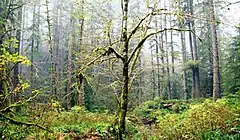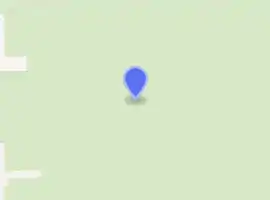Elliott State Forest
Elliott State Forest is a state forest in Coos and Douglas counties of the U.S. state of Oregon, between Coos Bay and Reedsport in the Oregon Coast Range.[2] The first state forest established in Oregon, it is named after the state's first state forester Francis Elliott.[3] Trees commonly found in this forest are the Douglas-fir, western hemlock, western redcedar, bigleaf maple, and red alder.[4]
| Elliott State Forest | |
|---|---|
 Elliott State Forest, November 2013 | |

| |
| Type | State forest, park |
| Location | Coos and Douglas counties, United States |
| Nearest city | Reedsport and Coos Bay |
| Coordinates | 43°35′05″N 124°01′04″W[1] |
| Area | 93,000 acres (380 km2) |
| Created | 1930 |
| Operated by | Oregon Department of Forestry |
More than 90 percent of the Elliott State Forest forms part of Oregon Common School Fund (CSF) lands devoted to supporting public education statewide. The Oregon Department of Forestry manages the CSF lands for the Oregon State Land Board, composed of Oregon's governor, secretary of state, and treasurer. Timber revenue from logging in the Elliott State Forest has generated about $284 million for schools since 1955.[3] (sourced to a dead link)
Management controversy
Controversy arose in 2011 in response to changes in the way the forest is managed. Adopted by the land board in October 2011, a new management plan aims to increase annual net revenue from the forest to $13 million, up from $8 million. It would achieve this by increasing the annual timber harvest to 40 million board feet culled from 1,100 acres (450 ha), of which about three-fourths could be clearcut. The former management plan, adopted in 1995, called for 25 million board feet from 1,000 acres (400 ha), half of it clearcut.[5][6]
The plan also changed the way in which the forest is managed to protect threatened and endangered species such as spotted owls and marbled murrelets. Supporters of the new plan say it will benefit wildlife by making more acres off-limits to logging than had been reserved for owls, murrelets, and watershed protection under the old plan. Opponents of the plan say it will damage habitat and harm wildlife. They would prefer a plan that promotes thinning of young trees, avoids clear-cutting, and seeks other ways of raising revenue from the CSF lands.[5]
Sale
At the February 2017 meeting of the Oregon State Land Board (OSLB) in Salem the board voted 2 to 1 in favor of amending the Protocol, the formalized process of sale. Additionally, the Oregon Department of State Lands (DSL) director Jim Paul was instructed to prepare a plan for retained public ownership and to present that plan at the next OSLB meeting.[7][8]
In 2012 and prior years, Elliott State Forest timber sales contributed substantial profits to the Common School Fund, typically on the order of $5 million per year. In 2013 and 2014, timber sales were below costs. Timber sales turned around in 2015 resulting in revenue of $0.7 million in 2015[9] for the Common School Fund. At the meeting, DSL director Jim Paul announced the Elliott generated $1.3 million in revenue for the Common School Fund as a preliminary figure.
The value of Elliott State Forest was originally assessed at between $260 and $440 million,[10] prompting the DSL set its value at the midpoint, $360 million, according to Secretary of State Dennis Richardson at the meeting. Given the February 2017 amendments to the Protocol, the purchase proposal of $221 million created by Elliott Forest, LLC will require revision. Elliott Forest LLC has two members: a company in Roseburg with international investors known as Lone Rock Timber Management Company, and the Pacific Northwest Cow Creek Band of Umpqua Tribe of Indians.
On May 9, 2017 the OSLB unanimously voted to cancel the sale process of the Elliott, ensuring that the forest would remain publicly owned.
See also
Further reading
- Cascadia Wildlands on the Elliott State Forest
References
- "Elliott State Forest". Geographic Names Information System. United States Geological Survey. November 28, 1980. Retrieved February 29, 2012. These are the coordinates for the part of the forest within the Trail Butte map quadrangle.
- "Elliott State Forest". Oregon Department of Forestry. December 21, 2011. Archived from the original on March 2, 2011. Retrieved February 28, 2011.
- "2009–2011 Backgrounder: Elliott State Forest" (PDF). Oregon Department of Forestry. Retrieved February 29, 2012.
- "Elliott State Forest, Oregon". Public Lands Information Center. Retrieved February 29, 2012.
- Eric Mortenson (October 11, 2011). "Forest Plan OK'd Amid Hisses". The Oregonian. Portland.
- Andrew Theen (November 16, 2016). "Elliott State Forest: Timber company bands together with tribe for lone bid". Retrieved February 15, 2017.
- "Land Board approves modification to potential sale of Elliott State Forest" (PDF). Oregon Dept State Lands. February 14, 2017. Retrieved February 15, 2017.
- "Land Board approves modification to potential sale of Elliott State Forest". KCBY. February 14, 2017. Retrieved February 15, 2017.
- "Elliott State Forest sale: Timber, threatened species and politics collide". Oregonian (newspaper). November 15, 2016. Retrieved February 24, 2017.
- "Who's In The Mix To Buy Oregon's Elliott State Forest?". Oregon Public Broadcasting. December 16, 2015. Retrieved February 15, 2017.
External links
- Oregon Department of Forestry State Forests